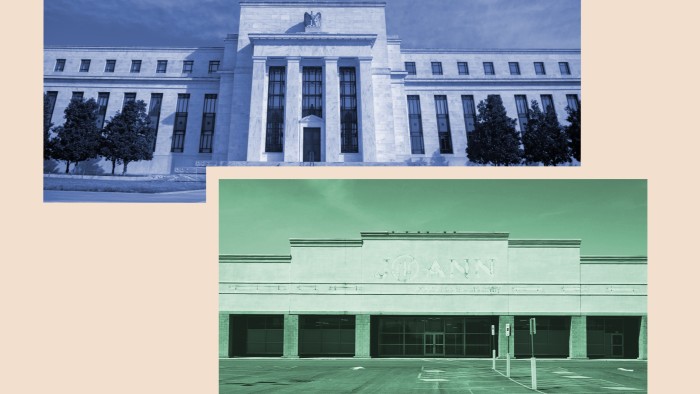Higher interest rates and lower consumer spending are squeezing debt-laden companies backed by private equity groups, forcing them to either restructure through bankruptcy or buy time to recover via out-of-court settlements with creditors.
The stress on private equity-backed companies shows up starkest in a recent study by S&P Global Market Intelligence, which shows that a record number of 110 private equity and venture capital-backed companies filed for bankruptcy in 2024.
These failures, concentrated in the consumer and healthcare sectors, show how even as the US unemployment rate remains low and the S&P 500 ploughs ever higher, certain corners of corporate America are hurting, with many companies struggling to survive under the pressure of high interest rates, lower consumer spending and crippling stacks of debt.
“I think the initial reason why companies file for bankruptcy when they’ve been a subject of an acquisition by private equity, is there’s too much debt,” said Lawrence Kotler, a law partner that focuses on bankruptcy at Duane Morris. “Everything is leveraged to the hilt.”
High interest rates took a toll across the US corporate landscape last year, with bankruptcies hitting their highest level since the financial crisis. But PE and VC-backed companies have been particularly hard hit, with portfolio companies comprising a rising — and record — share of corporate bankruptcies, according to S&P data.
The data, which dates back to 2010, includes private companies with majority private equity ownership and it also includes some publicly traded companies with minority strategic investments by private equity shops.
A narrower analysis by FTI Consulting focused on larger private equity filings does not show a similar rise, but notes the out-of-court tactics suppressing the number of private equity-related bankruptcies in recent years.
Overwhelming debt loads were made tougher to shoulder by the Federal Reserve’s rate hikes, which directly affected the cost of paying back floating-rate loans taken out by private equity-sponsored portfolio companies. Those high interest rates have now remained elevated for nearly three years, and the odds of relief in the form of aggressive cuts have diminished.
The software company ConvergeOne, taken private by CVC Capital Partners in 2019, exemplifies the trouble facing private equity portfolio companies.
The software group, known for its cloud and cyber security products and now called C1, went on a buying spree in the years following its last takeover, taking on debt to snap up seven companies just before interest rates started to rise.
In the end, the debt proved too much to sustain. Last spring, ConvergeOne filed for bankruptcy with just $21mn in the bank, and $1.8bn in debt. CVC declined to comment, and ConvergeOne did not respond to a request for comment.
“Consumers search for ways to find value when inflation bites,” said Mike Best, a high yield portfolio manager at Barings. “The market is littered with bankruptcies in the consumer products and retail sectors,” he added.
While most private equity-backed companies fail from a combination of too much debt and operational troubles, some cases stir up acerbic allegations. One prime case: Instant Brands, which makes the popular Instant Pot pressure cookers, has emerged as one of those hotly contested corporate failures.
In 2019, Cornell Capital bought Instant Brands for just over $600mn. By 2023, the kitchen appliances maker had filed for bankruptcy. Shortly after the company sought court protection, creditors accused Cornell of siphoning large amounts of cash from the company’s coffers.
Creditors sued Cornell Capital and certain executives in November for having “plundered the portfolio company” by taking out a $345mn dividend for its investors, which the complaint alleges left Instant Brands insolvent.
A trial over the allegations is scheduled to start later this year. A spokesperson for Cornell Capital in a statement called the lawsuit’s allegations “baseless attacks” and disputed that the dividend recapitalisation led to Instant Brands’ bankruptcy, instead citing “uncontrollable macroeconomic events.”
Meanwhile, out-of-court manoeuvres to stave off insolvency, commonly called liability management exercises or LMEs, have shot up as companies seek to avoid Chapter 11.
“Private equity sponsors have a heightened interest in LMEs,” David Meyer, head of law firm Vinson and Elkins’ restructuring and reorganisation group, said in an interview. “The primary focus is: how can we address a situation out of court?”
While popular, the solution rarely lasts. Just under half of respondents to an AlixPartners survey from October described liability management exercises as successful. Only 3 per cent said they turned out to be permanent fixes.

Despite efforts to stave off insolvency, some companies have earned the dubious distinction of entering “Chapter 22” or “Chapter 33” proceedings, a sobriquet indicating their second or third successive bankruptcy.
One of the most recent such cases is Joann, an Ohio-based fabrics and sewing supplies retailer with hundreds of locations, thousands of employees and two separate bankruptcy filings in the past year.
Joann was taken private for $1.6bn in 2011 by private equity firm Leonard Green and Partners. The firm then took Joann public in 2021 while remaining its largest shareholder.
Business boomed in 2020 thanks to the popularity of crocheting and other crafts during Covid-19 lockdowns. But sales slowed as the pandemic ebbed, higher rates more than doubled the company’s interest payments and supply chain issues snarled its inventory — even as 96 per cent of its stores were cash flow positive, according to filings.
The company filed for bankruptcy in March. It emerged a month later after slashing half of its $1bn in debt, but ultimately returned to Chapter 11 earlier this month, this time blaming the difficulty to keep vendors shipping products. Joann and Leonard Green did not respond to requests for comment.
“The tide has gone out, and a lot of boats are rocking over,” said Jerrold Bregman, a partner at BG Law. Private equity companies prefer to sell or float their holdings at a profit, he added. “Typically, all they’re looking to do is get to a liquidity event and make some money.”
Read the full article here




